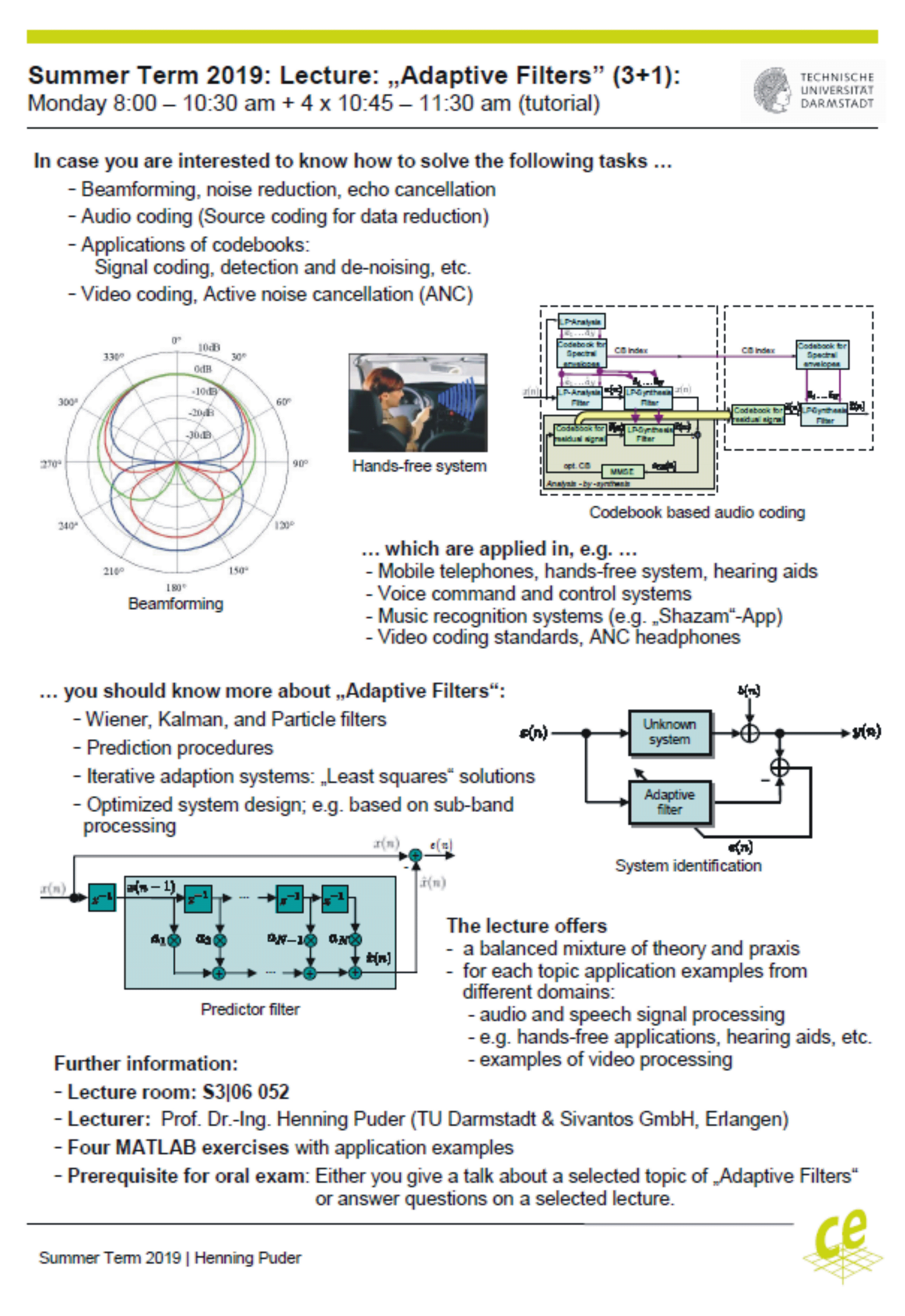
Lehrinhalte
[b]Theory:[/b]
1) Derivation of optimal filters for stochastic processes, e.g. Wiener filter or linear prediction filter based on suitable cost functions.
2) Elaboration of adaptive procedures, which allow to iteratively approach the optimal solution for non-stationary signals in non-stationary environments. Here, the adaptive procedures such as NLMS adaptation, affine projection, and the RLS algorithm are derived and extensively analysed.
3) Analysis of the adaptation behaviour and control procedures of adaptive filters based on the NLMS procedure.
4) Derivation and analysis of the Kalman filter as optimal filter for non-stationary input signals.
5) Procedures for the decomposition of signals into sub-bands for the realization of optimal filters in the frequency domain, e.g. noise reduction procedures.
[b]Applications:[/b]
Parallel to the theory, practical applications are explained. As an example for the Weiner filter, the acoustic noise reduction procedures are explained. Acoustic echo cancellation and feedback cancellation are given as examples for adaptive filters. Furthermore beamforming approaches are introduced.
It is planned to offer an excursion to Siemens Audiology Engineering Group in Erlangen.
In the 4 to 5 exercises, some content of the lecture will be implemented in MATLAB which allows the students to get familiar with practical realizations of the theoretical procedures.
Literatur
Slides of the lecture.
Literature:
[list]
[*]E. Hänsler, G. Schmidt: Acoustic Echo and Noise Control, Wiley, 2004 (Textbook of this course);
[*]S. Haykin: Adaptive Filter Theory, Prentice Hall, 2002;
[*]A. Sayed: Fundamentals of Adaptive Filtering, Wiley, 2004;
[*]P. Vary, U. Heute, W. Hess: Digitale Sprachsignalverarbeitung, Teubner, 1998 (in German)
[/list]
Voraussetzungen
Digital Signal Processing
[b]Theory:[/b]
1) Derivation of optimal filters for stochastic processes, e.g. Wiener filter or linear prediction filter based on suitable cost functions.
2) Elaboration of adaptive procedures, which allow to iteratively approach the optimal solution for non-stationary signals in non-stationary environments. Here, the adaptive procedures such as NLMS adaptation, affine projection, and the RLS algorithm are derived and extensively analysed.
3) Analysis of the adaptation behaviour and control procedures of adaptive filters based on the NLMS procedure.
4) Derivation and analysis of the Kalman filter as optimal filter for non-stationary input signals.
5) Procedures for the decomposition of signals into sub-bands for the realization of optimal filters in the frequency domain, e.g. noise reduction procedures.
[b]Applications:[/b]
Parallel to the theory, practical applications are explained. As an example for the Weiner filter, the acoustic noise reduction procedures are explained. Acoustic echo cancellation and feedback cancellation are given as examples for adaptive filters. Furthermore beamforming approaches are introduced.
It is planned to offer an excursion to Siemens Audiology Engineering Group in Erlangen.
In the 4 to 5 exercises, some content of the lecture will be implemented in MATLAB which allows the students to get familiar with practical realizations of the theoretical procedures.
Literatur
Slides of the lecture.
Literature:
[list]
[*]E. Hänsler, G. Schmidt: Acoustic Echo and Noise Control, Wiley, 2004 (Textbook of this course);
[*]S. Haykin: Adaptive Filter Theory, Prentice Hall, 2002;
[*]A. Sayed: Fundamentals of Adaptive Filtering, Wiley, 2004;
[*]P. Vary, U. Heute, W. Hess: Digitale Sprachsignalverarbeitung, Teubner, 1998 (in German)
[/list]
Voraussetzungen
Digital Signal Processing
- Lehrende: Martin Gölz
- Lehrende: Henning Puder
Semester: ST 2019